Items
Subject is exactly
Race & Ethnicity
-
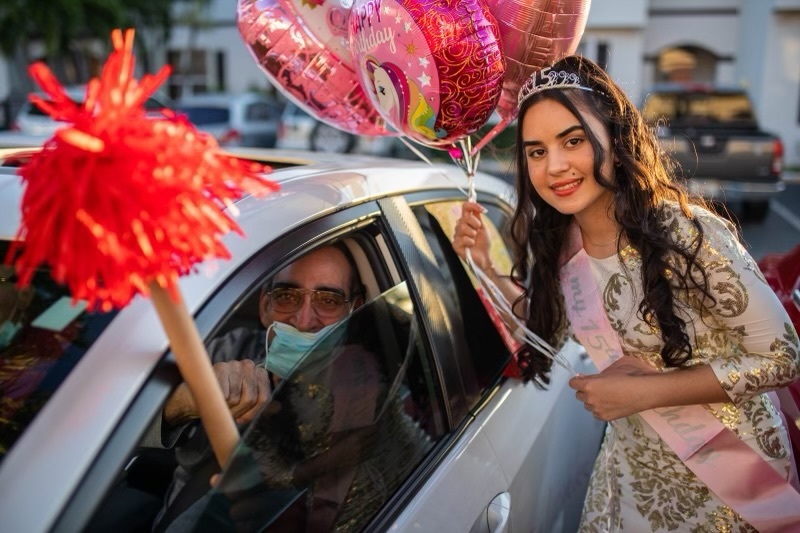 2020-05-06
2020-05-06Drive Through Birthday
On May 6, 2020, my childhood best friend officially turned 15. It may be just another birthday for most. However, in Hispanic culture, it means a girl's shift from childhood to womanhood. Usually celebrated by parties filled with hundreds of people, princess dresses, cultural food, music, and gifts. Due to the pandemic, it was diminished to a drive-through celebration filled with masks and distance between loved ones. It was a memorable birthday; nevertheless, a significant part of the typical Hispanic cultural experience was stripped away from her. -
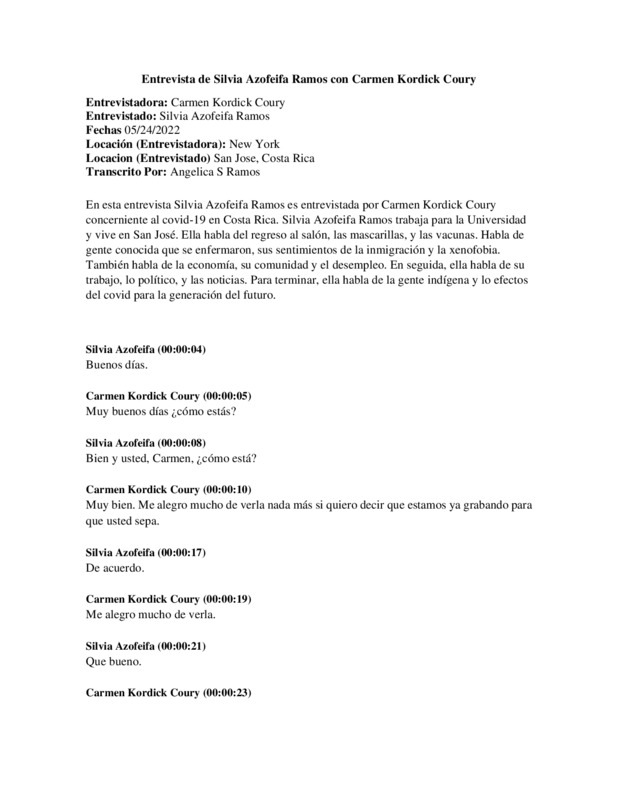 05/24/2022
05/24/2022Silvia Azofeifa Ramos Oral History, 2022/05/24
En esta entrevista Silvia Azofeifa Ramos es entrevistada por Carmen Kordick Coury concerniente al covid-19 en Costa Rica. Silvia Azofeifa Ramos trabaja para la Universidad y vive en San José. Ella habla del regreso al salón, las mascarillas, y las vacunas. Habla de gente conocida que se enfermaron, sus sentimientos de la inmigración y la xenofobia. También habla de la economía, su comunidad y el desempleo. En seguida, ella habla de su trabajo, lo político, y las noticias. Para terminar, ella habla de la gente indígena y lo efectos del covid para la generación del futuro. -
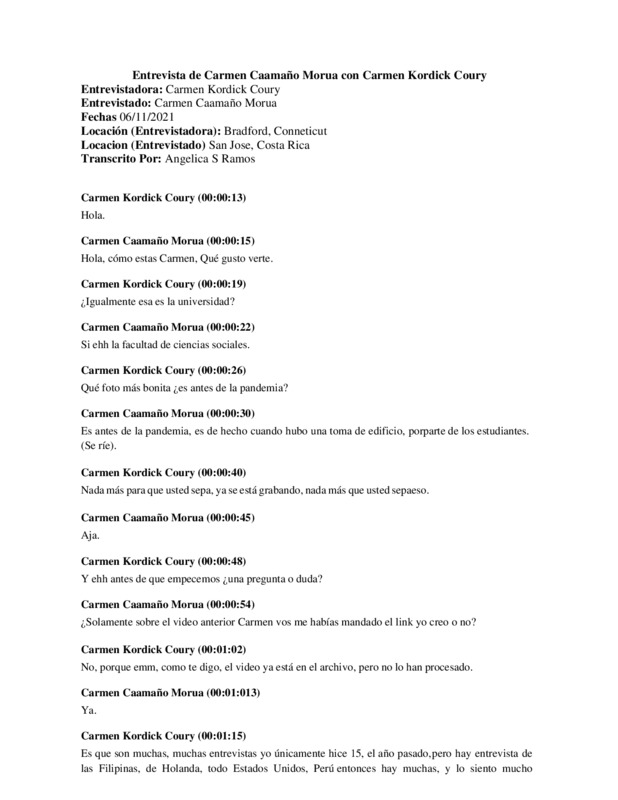 06/11/2021
06/11/2021Carmen Caamaño Morua Oral History, 2021/06/11
En esta entrevista Carmen Caamaño Morua es entrevistado por Carmen Kordick Coury concerniente al covid-19 en Costa Rica. Carmen es profesora en la Universidad de Costa Rica y vive en San José. Habla de su trabajo virtual en la universidad, del crisis de la salud mental y de la gente que cree en las teorías de la conspiración. Carmen habla de la relación entra las ciencias y la religión y como eso afecta los sentimientos hacia la vacuna. Habla de la xenofobia, el racismo y el clasismo. También habla de las vacunas y la respuesta del gobierno. Para terminar, Carmen habla del gobierno, la economía y las noticias. -
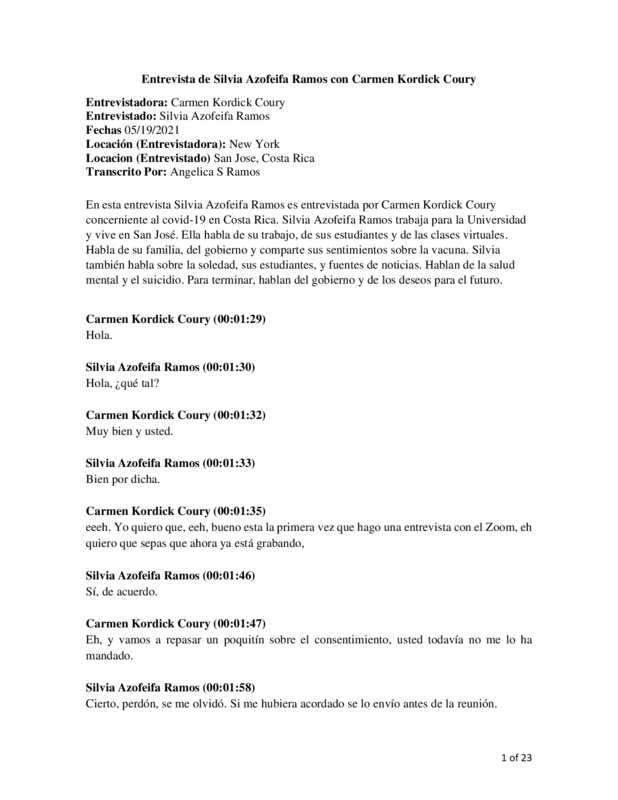 05/19/2021
05/19/2021Silvia Azofeifa Ramos Oral History, 2021/05/19
En esta entrevista Silvia Azofeifa Ramos es entrevistada por Carmen Kordick Coury concerniente al covid-19 en Costa Rica. Silvia Azofeifa Ramos trabaja para la Universidad y vive en San José. Ella habla de su trabajo, de sus estudiantes y de las clases virtuales. Habla de su familia, del gobierno y comparte sus sentimientos sobre la vacuna. Silvia también habla sobre la soledad, sus estudiantes, y fuentes de noticias. Hablan de la salud mental y el suicidio. Para terminar, hablan del gobierno y de los deseos para el futuro. -
2022-05-16
Prejudice and Hope during Covid-19
At the beginning of 2021, I spent one of the most memorable fun time in my life with my friends at the Coming of Age ceremony. Two days later, I had one more memorable days in my life, but in a negative mode: I got Covid-19, and it transferred to all my family members. During that time, I felt fear of being perceived as Covid-19-infected by others since a lot of prejudice led by Covid-19 was happening in the world and even in my neighborhood. In this essay, I would like to use my experience to analyze the human selfish and altruistic reactions to the Covid-19 pandemic. When I got infected with Covid-19, I had a high fever of 103 degrees, had difficulty breathing, and could not eat properly for several days. My father was hospitalized for about a week because he kept coughing and had difficulty breathing. The whole family was infected with Covid-19and had to be treated at home and quarantined at home, so we could not go out to buy daily necessities and food. The food that was in the refrigerator was running out with each passing day. At that time, I was afraid to confess to anyone outside my family that I had Covid-19 even though I was cured. The reason for this was that I saw on the news that there was a hate movement against Japanese and Asians living in European countries and the United States around the spring of 2020 when the Covid-19 pandemic began. Later on, as the Covid-19 damage grew, President Trump called the coronavirus the “Chinese virus,” and there were many Asians, including Chinese, who were labeled and discriminated against in the daily news. Even around my home, there were people who looked harshly at people labeled as "corona-infected," "pathogens," or "dangerous people," even if they had been infected with Covid-19 and had already recovered completely. I was afraid that if my neighbors and friends found out that I had Covid-19 and labeled me dishonorably. I thought that the distrust and inter-personal level of hatred that people possess for people who have actually been infected with Covid-19 comes from the “state of nature” that Thomas Hobbes advocated in his writing. Hobbes explains that the state of nature is when humans “seek peace and follow it… by all means [humans] can to defend [themselves]”. The state of war, in which men fight what men perceive as a target (in this case, the threat of the Covid-19) in order to protect themselves, seems to have given rise to this discrimination. And that discriminatory view grew socially and led to the Asian Hate of the time. In addition to the fear held by individuals, I guess the manipulation of social impressions at the time also led to Asian hate. The world was under a medical crunch in all countries following the explosive spread of the Covid-19, and there was a shortage of hospital beds and respiratory equipment. This could be attributed to policies and measures in the medical field that could not respond well to the sudden pandemic or the failure to provide the public with the correct information. However, medical policies and government thinking of the time shifted the blame. They tried to deflect public anger and attention with a different vector, trying to place the responsibility for the entire pandemic on the "Chinese virus" and the Asians. Public opinion, not medical evidence, established the cause of the pandemic, which was similar to what happened in San Francisco, California, hundreds of years ago during a plague epidemic, according to Joan B. Trauner's article. Chinatown in San Francisco was created to isolate immigrants from China during the plague epidemic, and the health office regarded them as the cause of the disaster. The government and the health officer did not want to be responsible for the existence of a plague epidemic. Trauner, in his writing the Chinese as Medical Scapegoats in San Francisco, describes the perspective of the medical officer in San Francisco at the time: "the pronouncements of the board and the health officer were often characterized by political or social expedience, rather than by scientific insight”. The government and the health department utilized the presence of Chinese immigrants for social expediency. The fear, the anger born of fear, and the desire to protect oneself have not changed from the time Hobbes wrote The Leviathan, through Trauner, to the present day in the 21st century. Especially in extraordinary situations like a pandemic, it will lead to new discrimination and more people being treated unfairly. But I have found one hope during this pandemic. During the time my family was homebound, when we had nowhere to go shopping and were finally running out of food, friends of my parents cooked and brought us meals for a few days, bought fruits and household items and delivered them to us. There were even heartful letters written by them. They did not avoid us as "dangerous people" but treated us with compassion. When humanity makes a positive turnaround from looking for the cause of this situation and shifting blame, to working together to overcome the situation that is happening now, we could overcome our fears, become altruistic, and strive to protect humanity as a whole. -
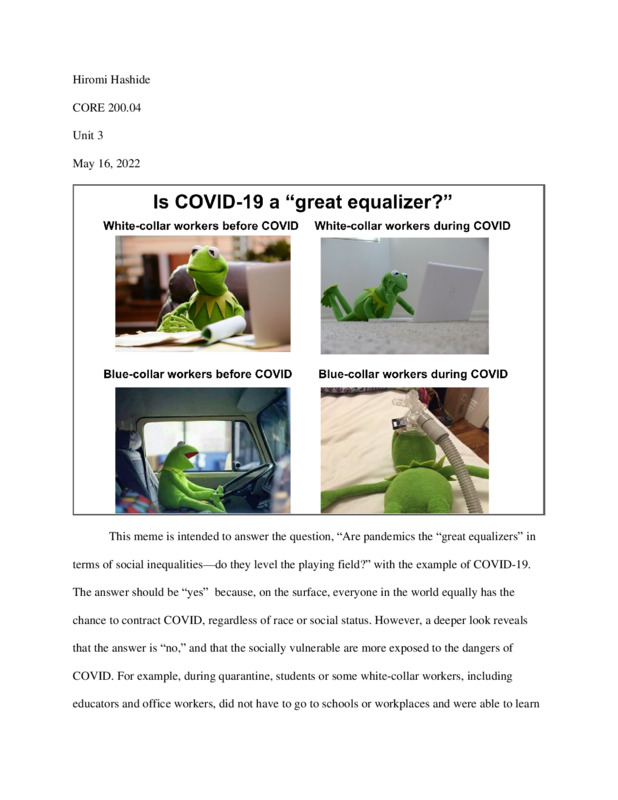 2020-05-16
2020-05-16Is COVID-19 a "Great Equalizer?" [DUPLICATE]
I made two memes. The first meme is intended to answer the question, “Are pandemics the “great equalizers” in terms of social inequalities—do they level the playing field?” with the example of COVID-19. And the meme says the answer is “no,” and that the socially vulnerable are more exposed to the dangers of COVID. The second meme is intended to answer the question, “Have you observed any patterns of human behavior with the Covid-19 pandemic?” Former President Trump called COVID the “China Virus” and fueled people’s hatred of Asians. This meme tries to remind the audience of his negative remarks but in a humorous way without offending Asian populations. It also illustrates how words can magnify feelings of racism, fear, and uncertainty, which can result in scapegoating. This meme gives the audience an opportunity to learn more about the unfair treatment of Asians during the pandemic and why it happened. -
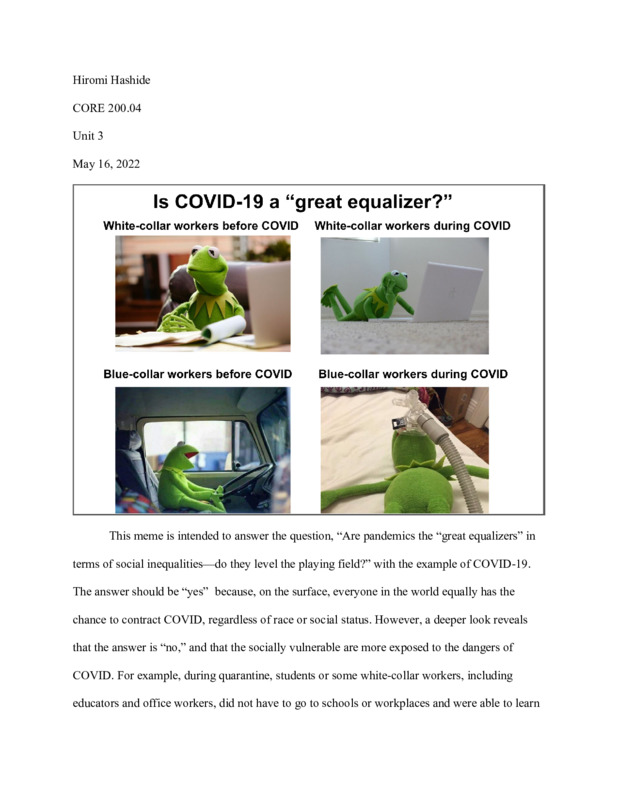 2000-05-16
2000-05-16Is COVID-19 a "Great Equalizer?"
I made two memes. The first meme is intended to answer the question, “Are pandemics the “great equalizers” in terms of social inequalities—do they level the playing field?” with the example of COVID-19. And the meme says the answer is “no,” and that the socially vulnerable are more exposed to the dangers of COVID. The second meme is intended to answer the question, “Have you observed any patterns of human behavior with the Covid-19 pandemic?” Former President Trump called COVID the “China Virus” and fueled people’s hatred of Asians. This meme tries to remind the audience of his negative remarks but in a humorous way without offending Asian populations. It also illustrates how words can magnify feelings of racism, fear, and uncertainty, which can result in scapegoating. This meme gives the audience an opportunity to learn more about the unfair treatment of Asians during the pandemic and why it happened. -
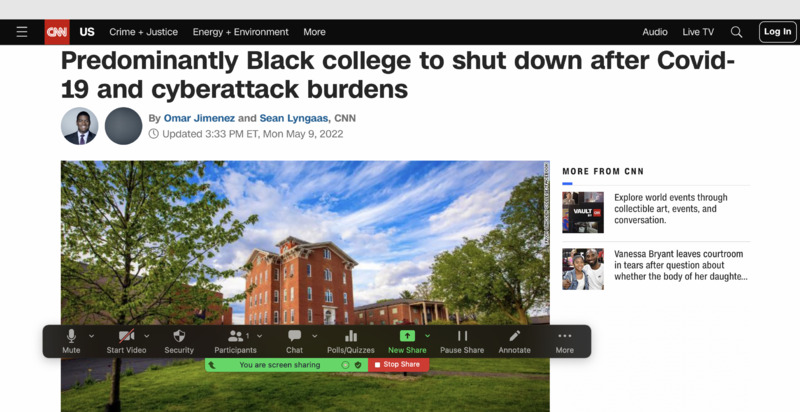 2022-05-09
2022-05-09Predominantly Black college to shut down after Covid-19 and cyberattack burdens
This is a news story from CNN by Omar Jimenez. After more than 150 years, Lincoln College in Illinois will be closing its doors due to struggles on cyber attacks and COVID. This college is significant because it was the only college to be named after Abraham Lincoln when he was still alive, according to the US Department of Education. COVID created many economic burdens for the college with the transition to remote learning. COVID also created drops in enrollment. -
2022
Experience of COVID-19 in China and USA
As an international student, I have witnessed the spread of covid-19 in both China and the United States. While the virus harms humans in the same way, each country does it differently to humans facing the pandemic. I was in high school in Boston when the covid first broke out (in December?). At that time, there were only two cases in Boston, so everyone didn't care much about the virus far across the ocean. As a Chinese, I know that coronavirus has caused countless pain in Wuhan, China. Therefore, I wrote a petition to the school to advocate wearing masks at school to avoid infection. However, the absurdity of things is far beyond my imagination. My high school principal sent an email to all international students (most of us are Asians) telling us that masks do not help people stay away from the virus. He also required us not to wear masks in school because it would cause panic among other local students. This implicit discrimination against Asians is a hurt. In March, I decided to return to China from the US to visit my family. It was a tough decision, not only in the sense of risking my life but in the process. I overcame the flight's cutting off and was cancelled by seven flights to get on the plane home. But when I finally returned to China and was quarantined for 14 days, I discovered the maliciousness toward international students on the Internet. Everyone was repeating the sentence, "you can't serve the motherland, but you can be the first to poison your country flying from thousands of miles away". This exclusion of outsiders is another harm. These hurt far more than covid did to me. -
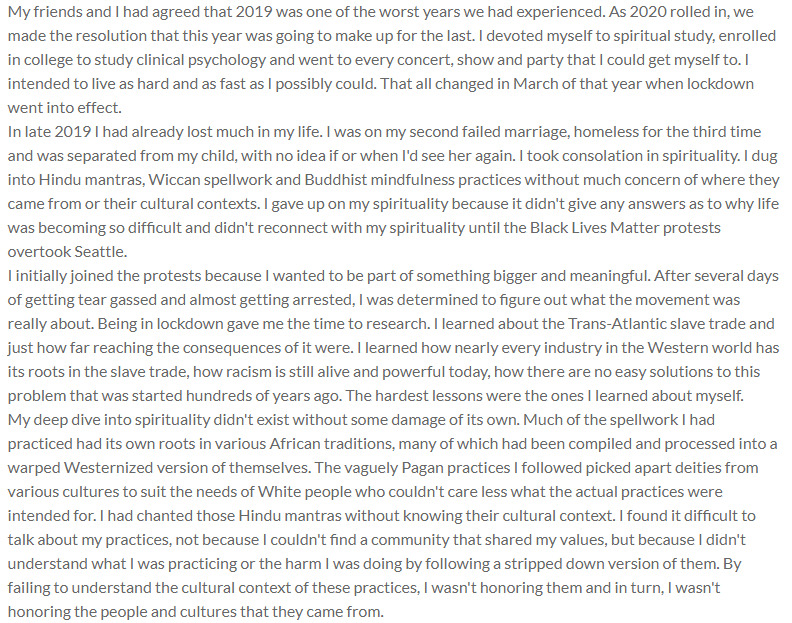 2020-05-29
2020-05-29The Unseen Harm of Western Spirituality
My friends and I had agreed that 2019 was one of the worst years we had experienced. As 2020 rolled in, we made the resolution that this year was going to make up for the last. I devoted myself to spiritual study, enrolled in college to study clinical psychology and went to every concert, show and party that I could get myself to. I intended to live as hard and as fast as I possibly could. That all changed in March of that year when lockdown went into effect. In late 2019 I had already lost much in my life. I was on my second failed marriage, homeless for the third time and was separated from my child, with no idea if or when I'd see her again. I took consolation in spirituality. I dug into Hindu mantras, Wiccan spellwork and Buddhist mindfulness practices without much concern of where they came from or their cultural contexts. I gave up on my spirituality because it didn't give any answers as to why life was becoming so difficult and didn't reconnect with my spirituality until the Black Lives Matter protests overtook Seattle. I initially joined the protests because I wanted to be part of something bigger and meaningful. After several days of getting tear gassed and almost getting arrested, I was determined to figure out what the movement was really about. Being in lockdown gave me the time to research. I learned about the Trans-Atlantic slave trade and just how far reaching the consequences of it were. I learned how nearly every industry in the Western world has its roots in the slave trade, how racism is still alive and powerful today, how there are no easy solutions to this problem that was started hundreds of years ago. The hardest lessons were the ones I learned about myself. My deep dive into spirituality didn't exist without some damage of its own. Much of the spellwork I had practiced had its own roots in various African traditions, many of which had been compiled and processed into a warped Westernized version of themselves. The vaguely Pagan practices I followed picked apart deities from various cultures to suit the needs of White people who couldn't care less what the actual practices were intended for. I had chanted those Hindu mantras without knowing their cultural context. I found it difficult to talk about my practices, not because I couldn't find a community that shared my values, but because I didn't understand what I was practicing or the harm I was doing by following a stripped down version of them. By failing to understand the cultural context of these practices, I wasn't honoring them and in turn, I wasn't honoring the people and cultures that they came from. The Trans-Atlantic slave trade took more than just people from their homelands. It took and often destroyed entire cultures. That which didn't disappear became watered down to suit white tastes as entertainment or a fad. It removed all of the context from many spiritual practices, leaving the cultures they belonged to stripped of autonomy and history. In the modern day, this continues to be a problem. White people continue to consume other cultures for their own gain, often by adopting and reshaping them in a strange attempt at virtue signaling. We are nowhere near finding justice for all of the people that colonialism damaged. A large majority of nations are still considered developing, primarily due to colonialism and capitalism determining that these nations and their people only have value if they can provide something to first world nations. The road to reparation is a long one but it has to start by no longer centering white people and the developed nations and listening to those that have been hurt. -
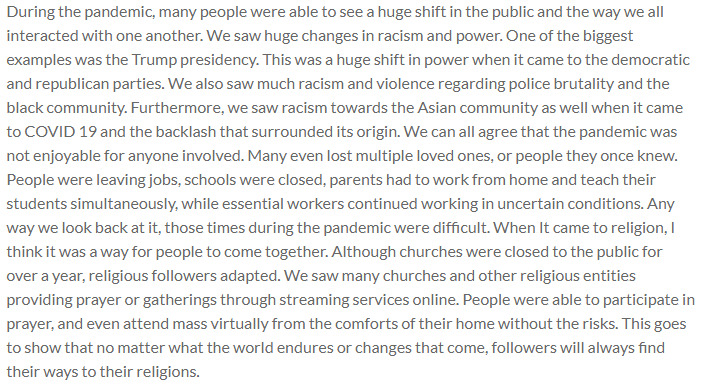 2022-04-28
2022-04-28Reflection
During the pandemic, many people were able to see a huge shift in the public and the way we all interacted with one another. We saw huge changes in racism and power. One of the biggest examples was the Trump presidency. This was a huge shift in power when it came to the democratic and republican parties. We also saw much racism and violence regarding police brutality and the black community. Furthermore, we saw racism towards the Asian community as well when it came to COVID 19 and the backlash that surrounded its origin. We can all agree that the pandemic was not enjoyable for anyone involved. Many even lost multiple loved ones, or people they once knew. People were leaving jobs, schools were closed, parents had to work from home and teach their students simultaneously, while essential workers continued working in uncertain conditions. Any way we look back at it, those times during the pandemic were difficult. When It came to religion, I think it was a way for people to come together. Although churches were closed to the public for over a year, religious followers adapted. We saw many churches and other religious entities providing prayer or gatherings through streaming services online. People were able to participate in prayer, and even attend mass virtually from the comforts of their home without the risks. This goes to show that no matter what the world endures or changes that come, followers will always find their ways to their religions. -
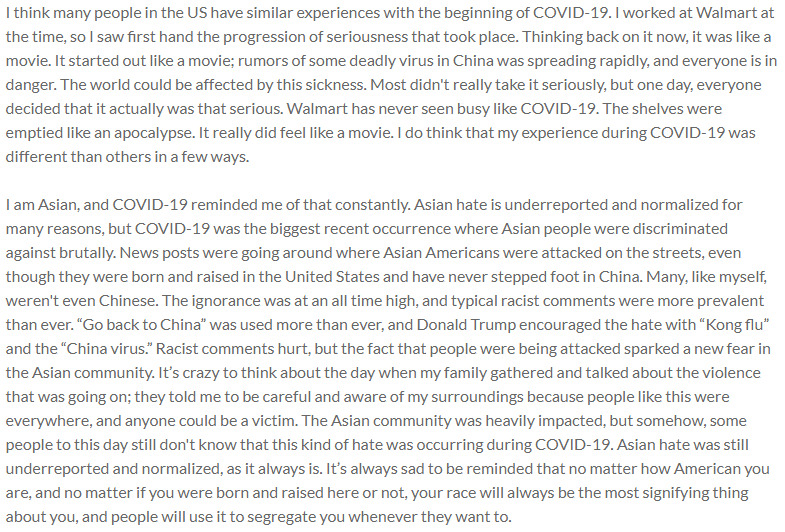 2022-04-25
2022-04-25Being Asian During COVID-19
I think many people in the US have similar experiences with the beginning of COVID-19. I worked at Walmart at the time, so I saw first hand the progression of seriousness that took place. Thinking back on it now, it was like a movie. It started out like a movie; rumors of some deadly virus in China was spreading rapidly, and everyone is in danger. The world could be affected by this sickness. Most didn't really take it seriously, but one day, everyone decided that it actually was that serious. Walmart has never seen busy like COVID-19. The shelves were emptied like an apocalypse. It really did feel like a movie. I do think that my experience during COVID-19 was different than others in a few ways. I am Asian, and COVID-19 reminded me of that constantly. Asian hate is underreported and normalized for many reasons, but COVID-19 was the biggest recent occurrence where Asian people were discriminated against brutally. News posts were going around where Asian Americans were attacked on the streets, even though they were born and raised in the United States and have never stepped foot in China. Many, like myself, weren't even Chinese. The ignorance was at an all time high, and typical racist comments were more prevalent than ever. “Go back to China” was used more than ever, and Donald Trump encouraged the hate with “Kong flu” and the “China virus.” Racist comments hurt, but the fact that people were being attacked sparked a new fear in the Asian community. It’s crazy to think about the day when my family gathered and talked about the violence that was going on; they told me to be careful and aware of my surroundings because people like this were everywhere, and anyone could be a victim. The Asian community was heavily impacted, but somehow, some people to this day still don't know that this kind of hate was occurring during COVID-19. Asian hate was still underreported and normalized, as it always is. It’s always sad to be reminded that no matter how American you are, and no matter if you were born and raised here or not, your race will always be the most signifying thing about you, and people will use it to segregate you whenever they want to. -
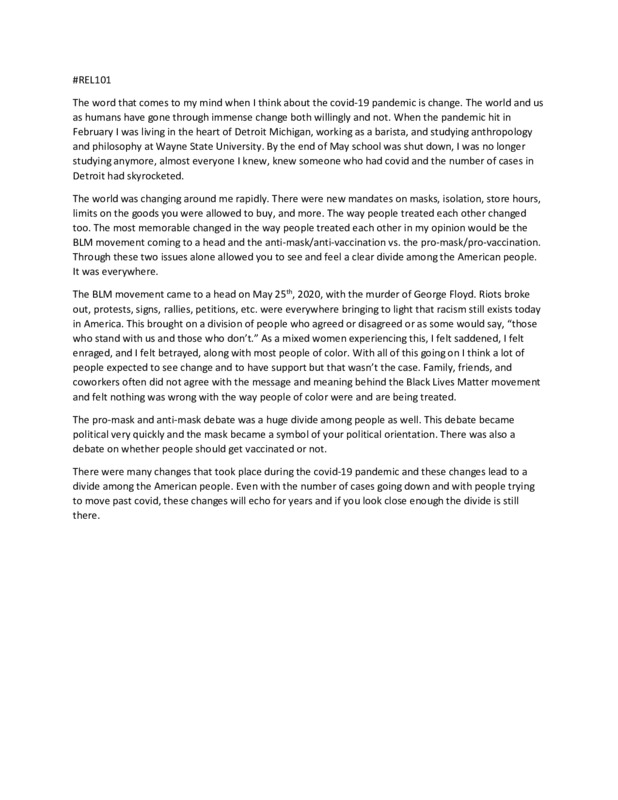 2022-04-23
2022-04-23#rel101 covid reflection story
this is a short reflection about the changes that happened during the covid-19 pandemic and the divide that occurred amongst American people -
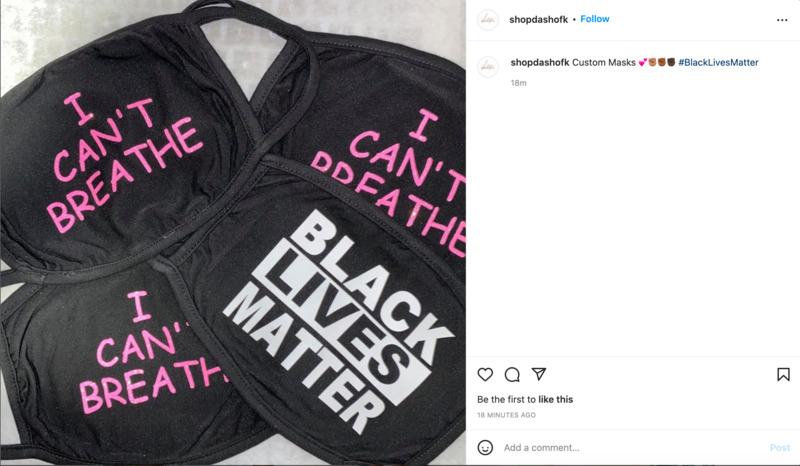 2022-04-11
2022-04-11Custom Black Lives Matter Masks
This is an Instagram post by shopdashofk. This is a post on custom masks with the words "Black Lives Matter" and "I Can't Breathe" written on them. These masks are meant to send a message on racial disparities between Black people and those of other races. Writing messages on masks has been a trend across all political spectrums, with some choosing different slogans or symbols to use, in order to send messages much like the masks featured here. This evokes some of the larger culture surrounding mask wearing in general, where they have been used much like graphic t-shirts to say messages people want heard. It is a new social phenomenon that has come with the pandemic, and it is still popular among some people. -
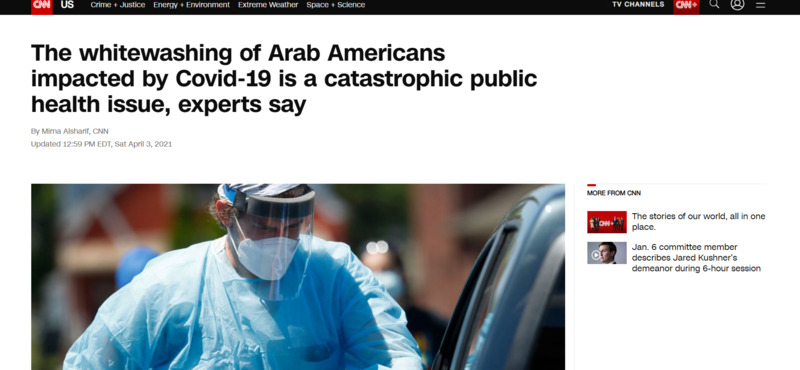 2021-04-03
2021-04-03The whitewashing of Arab Americans impacted by Covid-19 is a catastrophic public health issue, experts say
This article brings up important points regarding the underrepresentation of Middle Eastern and North African (MENA) people and communities in U.S. This article focuses primarily on Arab Americans, but also sheds light on the fact that there are no identifiers for Middle Eastern and North African people on the U.S. Census as their only options are to choose “white” or “other”. As a result, there is a lack of Covid-19 data specific to these communities which prevents support and information being directed to those underrepresented – and often socioeconomically underprivileged – groups. This article is important in demonstrating the vulnerability of this group. Many MENA families live in multi-generational homes, have preexisting medical conditions or risk factors which may make them more vulnerable should they contract Covid, and still some do not have access to the information and support needed to prevent Covid or to receive the proper treatment if infected. Additionally, because MENA people are not able to self-identify on the U.S. Census, the information about how these communities are being affected is not accurate. The U.S. Census isn’t the only place where these identifiers do not exist. Job, scholarship, and college applications (to name only a few) do not provide accurate identifiers for MENA individuals. I think this article is important in revealing the lack of identifiers available to MENA people and how important it is that this is changed soon. -
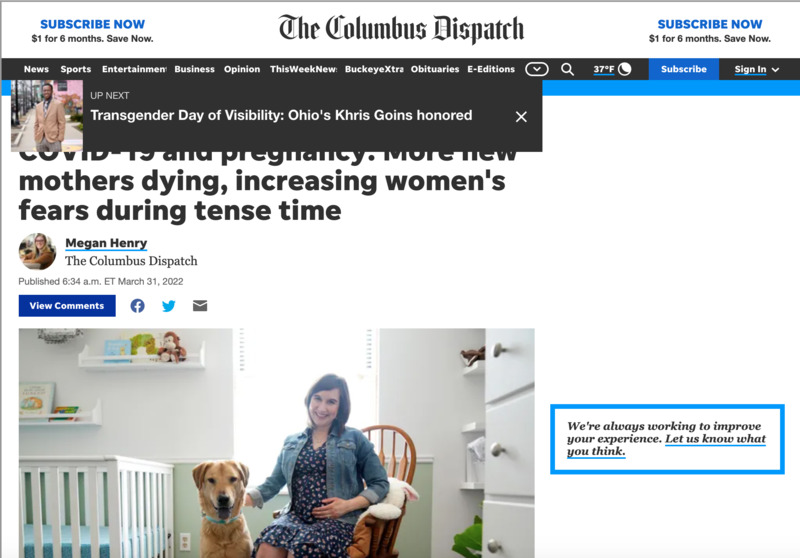 2022-03-31
2022-03-31COVID-19 and pregnancy: More new mothers dying, increasing women's fears during tense time
This is a news story from The Columbus Dispatch by Megan Henry. This story is about the rising fears of new mothers as COVID has increased their chances of dying. In 2020, motherhood mortality rate increased by 20% in the United States. There were also large disparities in who died, with Black women dying three times the rate of White women during pregnancy. Dr. Jason Melillo, an OB-GYN for OhioHealth claims that COVID is the main culprit for the rise in pregnancy related deaths. Pregnant women are more prone to complications from COVID, with things such as blood clots, stillbirth, and preeclampsia happening more often. This concern has made some couples only deciding on pregnancy until they have both been vaccinated. Dr. Melillo hopes that over time, mortality rates associated with pregnant women will go down. -
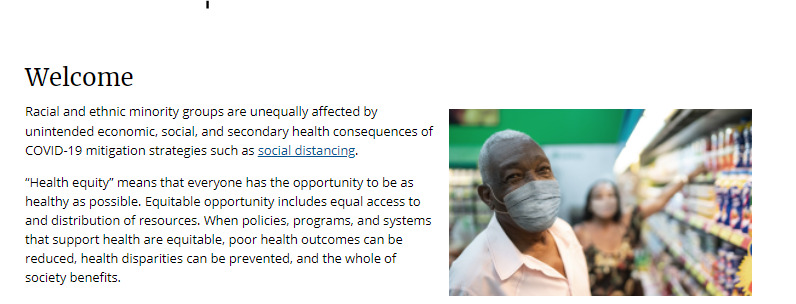 2020-12-10
2020-12-10Analysis of Racial Disparity in COVID by CDC
CDC page outlining racial disparity in the transmission and treatment of COVID-19. There are explanations given for the discrepancies pertaining to economic disparity as well. This illustrates the knowledge of the discrepancies in the transmission of COVID-19 across different racial backgrounds and social classes and possible solutions. -
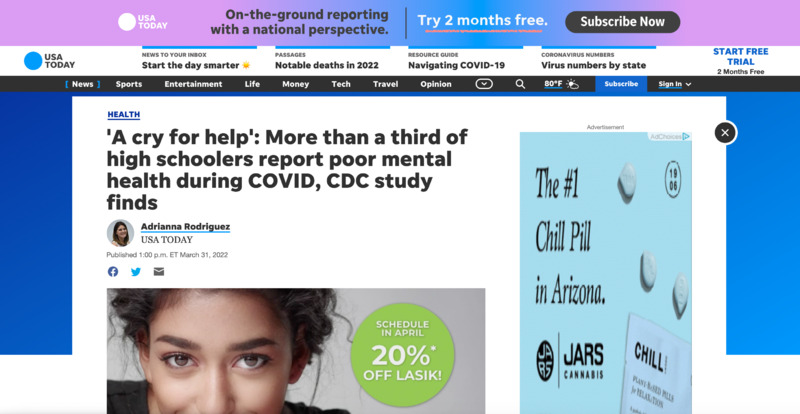 2022-03-31
2022-03-31'A Cry for Help': More than a Third of High Schoolers Report Poor Mental Health During COVID, CDC Study Finds
This is a story from USA Today by Adrianna Rodriguez. This is about the mental health in teens during the pandemic and how it has affected them. The CDC study that is cited says that 44% of high schoolers reported feeling persistently sad or helpless during 2021. Over half of the students surveyed were reported to have experienced emotional abuse from a parent, with 11% saying they have experienced physical abuse. Nearly 30% of students reported a parent or another adult in their house had lost a job. In a demographics breakdown, LGBT students reported more suicide attempts and poorer mental health than their counterparts. One third of students say that they have experienced racism. This article is meant to help show the impact COVID has had on people and the way lockdowns have impacted high schoolers specifically. -
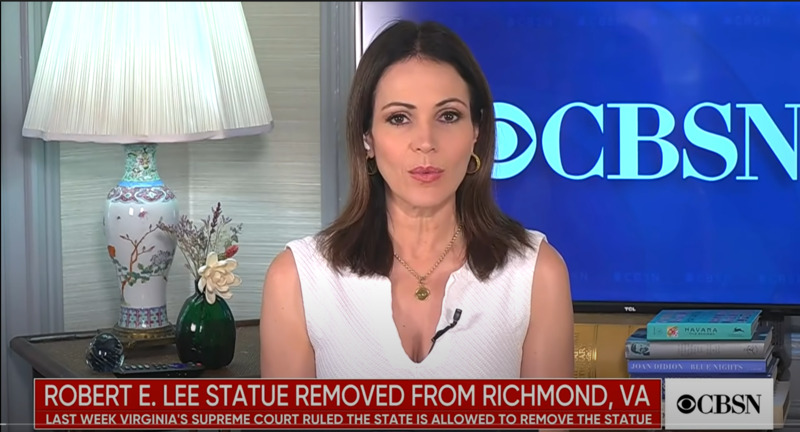 2021-09-08
2021-09-08Robert E. Lee Statue Removed from Richmond, VA
The removal of the Robert E. Lee statue in Richmond, VA was removed because of the racist history of Lee and how he failed to represent the many people living in Richmond today. Richmond, VA was once the capital of the south, but today, it is an eclectic city full of rich history. The removal of the statue was because of the many BLM protests that took place during the summer of 2020 after the murder of George Floyd. -
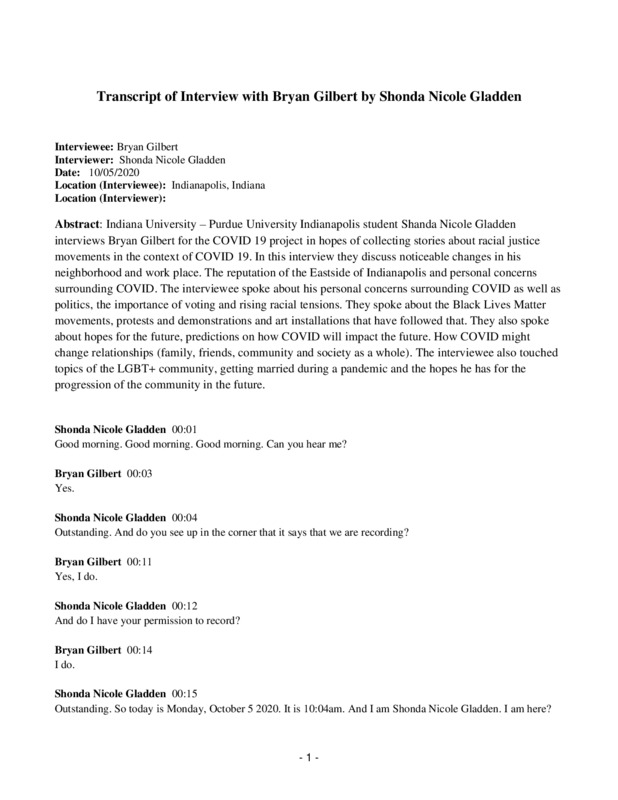 02/22/2021
02/22/2021Bryan Gilbert Oral HIstory, 2020/10/05
HIndiana University – Purdue University Indianapolis student Shanda Nicole Gladden interviews Bryan Gilbert for the COVID 19 project in hopes of collecting stories about racial justice movements in the context of COVID 19. In this interview they discuss noticeable changes in his neighborhood and work place. The reputation of the Eastside of Indianapolis and personal concerns surrounding COVID. The interviewee spoke about his personal concerns surrounding COVID as well as politics, the importance of voting and rising racial tensions. They spoke about the Black Lives Matter movements, protests and demonstrations and art installations that have followed that. They also spoke about hopes for the future, predictions on how COVID will impact the future. How COVID might change relationships (family, friends, community and society as a whole). The interviewee also touched topics of the LGBT+ community, getting married during a pandemic and the hopes he has for the progression of the community in the future. -
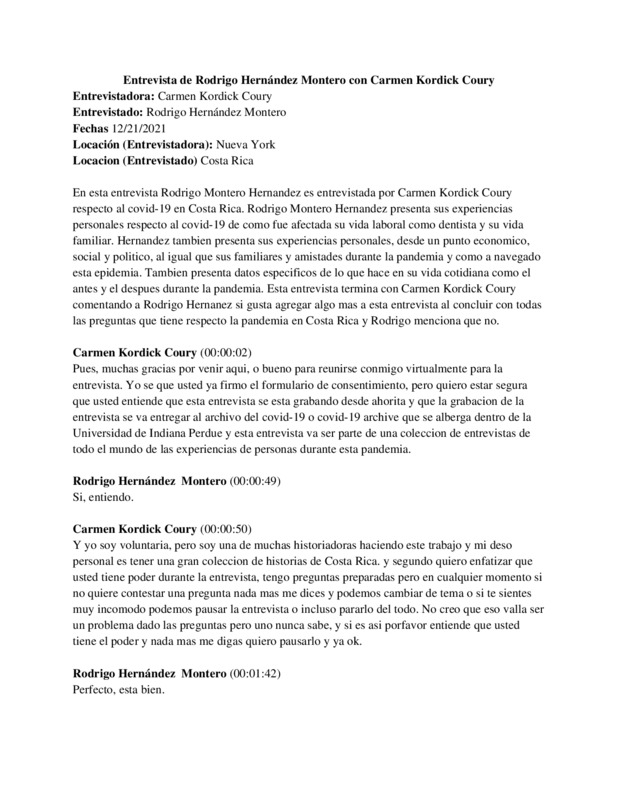 05/21/2020
05/21/2020Rodrigo Hernández Montero Oral History, 2020/05/21
En esta entrevista Rodrigro Hernandez Montero es entrevistado por Carmen Kordick Coury concerniente al covid-19 en Costa Rica. Rodrigo trabaja en odontología tiene 40 años y vive en Heredia. Trabaja en un hospital donde empezó a escuchar del virus por primera vez. Habla sobre el cambio que ocurrió en su trabajo y del protocoló de la cirugía oral. Describe los cambios de su rutina diario, reacciones de sus pacientes y el cambio de protección que empezó a usar, como la máscara N95. Rodrigo habla de cambios de la economía y como la pandemia afecto el negocio de su papá. Habla sobre su familia y las preacauciones que ha tomado al llegar del trabajo para proteger a sus ser queridos. Rodrigo habla del cambio del dinámico familiar y los sentimientos de aislado que siente en no poder ver a su familia y sus amigos. Habla de los fuentes principales de información donde el se mantiene informado. Para terminar, Rodrigo habla del gobierno, de la xenofobia y el miedo que existe en Costa Rica. -
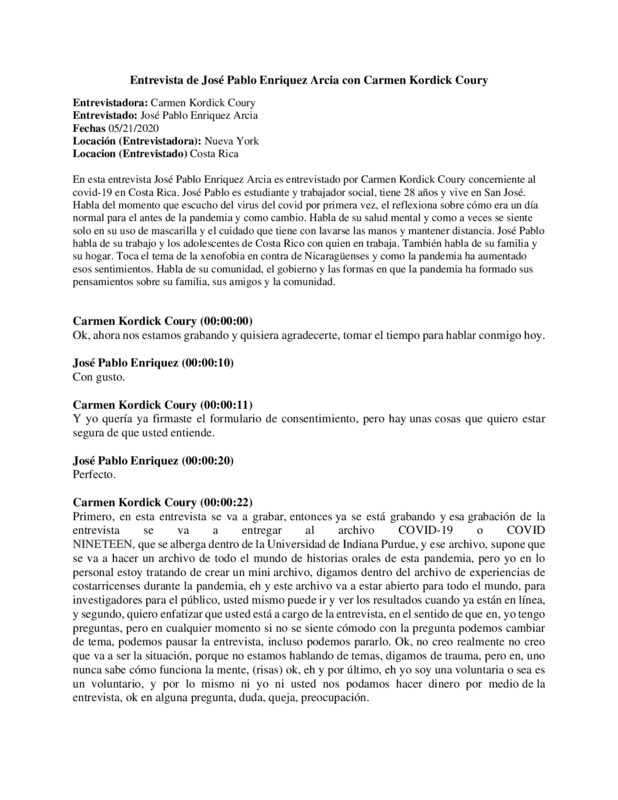 05/21/2020
05/21/2020José Pablo Enriquez Arcia Oral History, 2020/05/21
En esta entrevista José Pablo Enriquez Arcia es entrevistado por Carmen Kordick Coury concerniente al covid-19 en Costa Rica. José Pablo es estudiante y trabajador social, tiene 28 años y vive en San José. Habla del momento que escucho del virus del covid por primera vez, el reflexiona sobre cómo era un día normal para el antes de la pandemia y como cambio. Habla de su salud mental y como a veces se siente solo en su uso de mascarilla y el cuidado que tiene con lavarse las manos y mantener distancia. José Pablo habla de su trabajo y los adolescentes de Costa Rico con quien en trabaja. También habla de su familia y su hogar. Toca el tema de la xenofobia en contra de Nicaragüenses y como la pandemia ha aumentado esos sentimientos. Habla de su comunidad, el gobierno y las formas en que la pandemia ha formado sus pensamientos sobre su familia, sus amigos y la comunidad. -
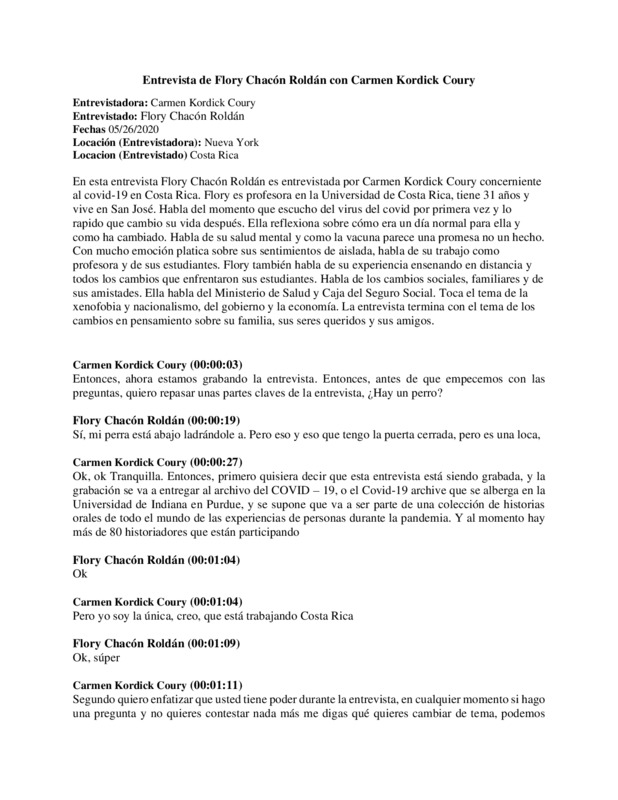 05/26/2020
05/26/2020Flory Chacón Roldán Oral History, 2020/05/26
En esta entrevista Flory Chacón Roldán es entrevistada por Carmen Kordick Coury concerniente al covid-19 en Costa Rica. Flory es profesora en la Universidad de Costa Rica, tiene 31 años y vive en San José. Habla del momento que escucho del virus del covid por primera vez y lo rapido que cambio su vida después. Ella reflexiona sobre cómo era un día normal para ella y como ha cambiado. Habla de su salud mental y como la vacuna parece una promesa no un hecho. Con mucho emoción platica sobre sus sentimientos de aislada, habla de su trabajo como profesora y de sus estudiantes. Flory también habla de su experiencia ensenando en distancia y todos los cambios que enfrentaron sus estudiantes. Habla de los cambios sociales, familiares y de sus amistades. Ella habla del Ministerio de Salud y Caja del Seguro Social. Toca el tema de la xenofobia y nacionalismo, del gobierno y la economía. La entrevista termina con el tema de los cambios en pensamiento sobre su familia, sus seres queridos y sus amigos. -
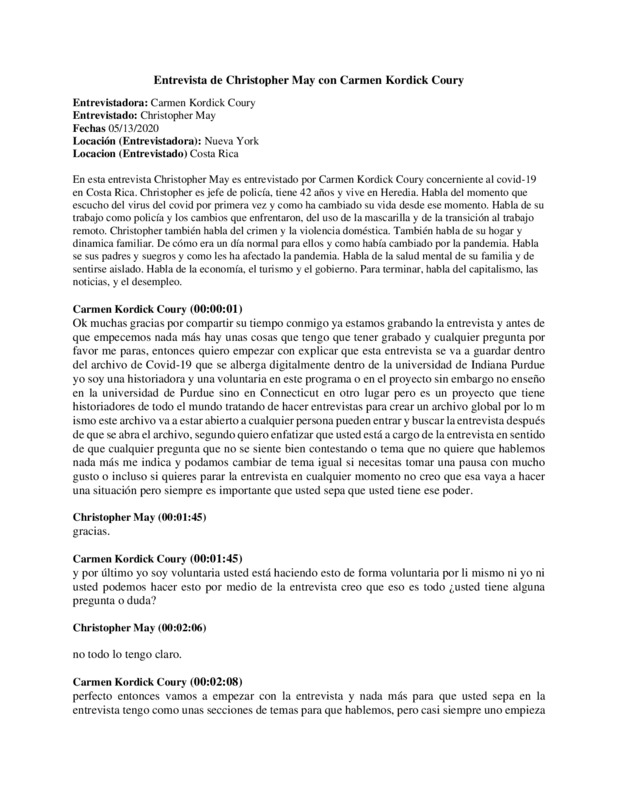 05/13/2020
05/13/2020Christopher May Oral History, 2020/05/13
En esta entrevista Christopher May es entrevistado por Carmen Kordick Coury concerniente al covid-19 en Costa Rica. Christopher es jefe de policía, tiene 42 años y vive en Heredia. Habla del momento que escucho del virus del covid por primera vez y como ha cambiado su vida desde ese momento. Habla de su trabajo como policía y los cambios que enfrentaron, del uso de la mascarilla y de la transición al trabajo remoto. Christopher también habla del crimen y la violencia doméstica. También habla de su hogar y dinamica familiar. De cómo era un día normal para ellos y como había cambiado por la pandemia. Habla se sus padres y suegros y como les ha afectado la pandemia. Habla de la salud mental de su familia y de sentirse aislado. Habla de la economía, el turismo y el gobierno. Para terminar, habla del capitalismo, las noticias, y el desempleo. -
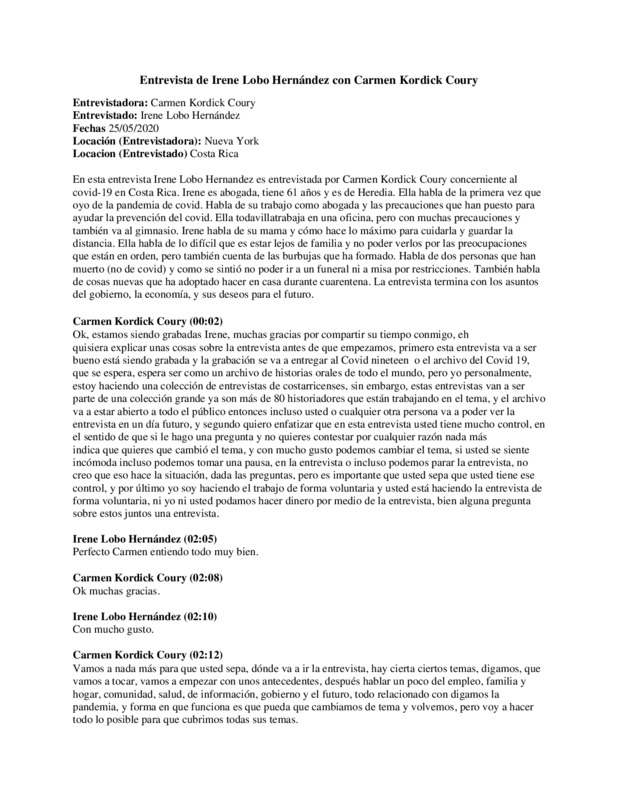 05/25/2020
05/25/2020Irene Lobo Hernández Oral History, 2020/05/25
En esta entrevista Irene Lobo Hernandez es entrevistada por Carmen Kordick Coury concerniente al covid-19 en Costa Rica. Irene es abogada, tiene 61 años y es de Heredia. Ella habla de la primera vez que oyo de la pandemia de covid. Habla de su trabajo como abogada y las precauciones que han puesto para ayudar la prevención del covid. Ella todavillatrabaja en una oficina, pero con muchas precauciones y también va al gimnasio. Irene habla de su mama y cómo hace lo máximo para cuidarla y guardar la distancia. Ella habla de lo difícil que es estar lejos de familia y no poder verlos por las preocupaciones que están en orden, pero también cuenta de las burbujas que ha formado. Habla de dos personas que han muerto (no de covid) y como se sintió no poder ir a un funeral ni a misa por restricciones. También habla de cosas nuevas que ha adoptado hacer en casa durante cuarentena. La entrevista termina con los asuntos del gobierno, la economía, y sus deseos para el futuro. -
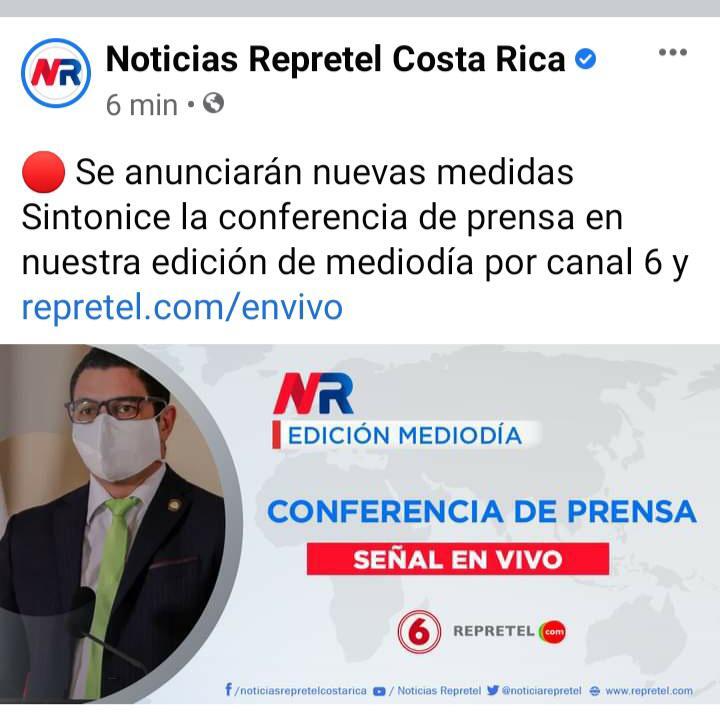 05/20/2021
05/20/2021Javier Echeverria Hernández Oral History, 2021/05/20
En esta segunda entrevista de Javier Hernández Echeverria con Carmen Kordick Coury, hablan de todo lo que ha ocurrido ya que paso un año desde la primera entrevista que tuvieron. Javier habla de sus opiniones sobre el turismo y las personas que viajan para vacunarse, sus opiniones de la Ministra de Salud y el cuidado que han dado a la gente de Costa Rica, Javier también da su opinión de que pudo causar que el numero de muertos subieron tan rápido en el pais. También hablan del uso de mascarillas y de las personas que no creen el la pandemia y la falta de uso de las mascarillas. Hablan de la corrupción de la gente que se están provechando de la situación, el efecto de la vacuna, y la economía. Javier también habla de salidas a los restaurantes con su esposa y la cooperación con el distanciamiento. Habla de amigos y familiares que han muerto al resultado de la pandemia, las ideas que tiene sobre la información falsa que el ha visto. Esta entrevista termina con sus deseos del futuro y sus opiniones de donde y porque origino esta pandemia. -
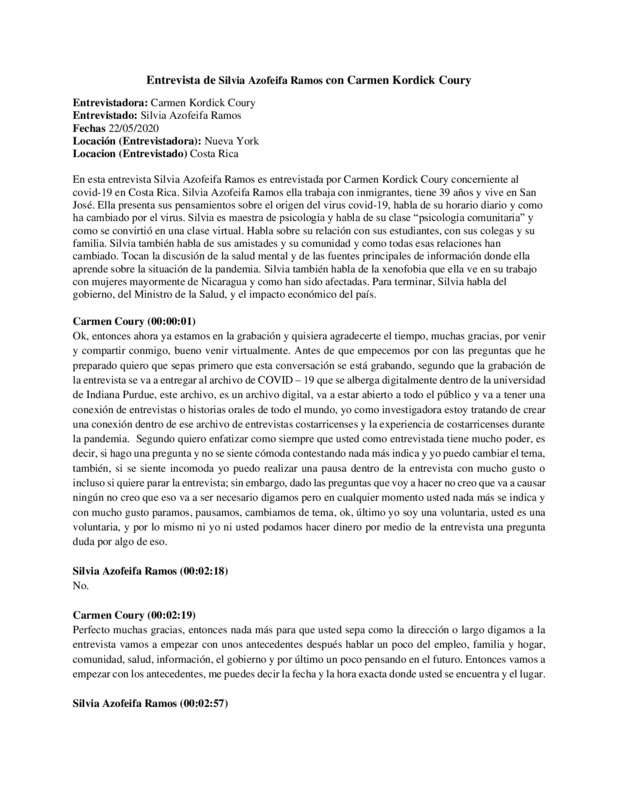 08/09/2020
08/09/2020Silvia Azofeifa Ramos Oral History, 2020/05/22
En esta entrevista Silvia Azofeifa Ramos es entrevistada por Carmen Kordick Coury concerniente al covid-19 en Costa Rica. Silvia Azofeifa Ramos ella trabaja con inmigrantes, tiene 39 años y vive en San José. Ella presenta sus pensamientos sobre el origen del virus covid-19, habla de su horario diario y como ha cambiado por el virus. Silvia es maestra de psicología y habla de su clase “psicología comunitaria” y como se convirtió en una clase virtual. Habla sobre su relación con sus estudiantes, con sus colegas y su familia. Silvia también habla de sus amistades y su comunidad y como todas esas relaciones han cambiado. Tocan la discusión de la salud mental y de las fuentes principales de información donde ella aprende sobre la situación de la pandemia. Silvia también habla de la xenofobia que ella ve en su trabajo con mujeres mayormente de Nicaragua y como han sido afectadas. Para terminar, Silvia habla del gobierno, del Ministro de la Salud, y el impacto económico del país. -
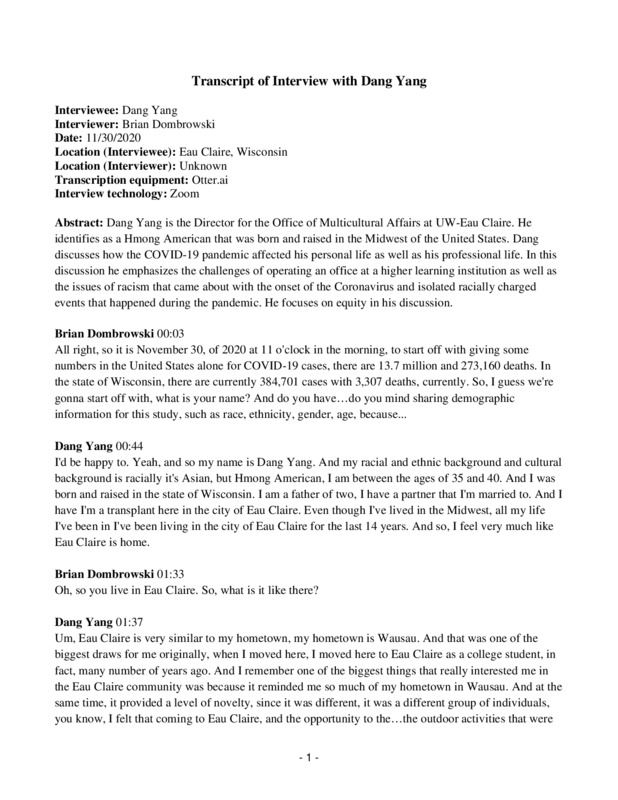 11/30/2020
11/30/2020Dang Yang Oral History, 2020/11/30
Dang Yang is the Director for the Office of Multicultural Affairs at UW Eau Claire. He identifies as a Hmong American that was born and raised in the Midwest of the United States. Dang discusses how the COVID-19 pandemic affected his personal life as well as his professional life. In this discussion he emphasizes the challenges of operating an office at a higher learning institution as well as the issues of racism that came about with the onset of the Coronavirus and isolated racially charged events that happened during the pandemic. He focuses on equity in his discussion. -
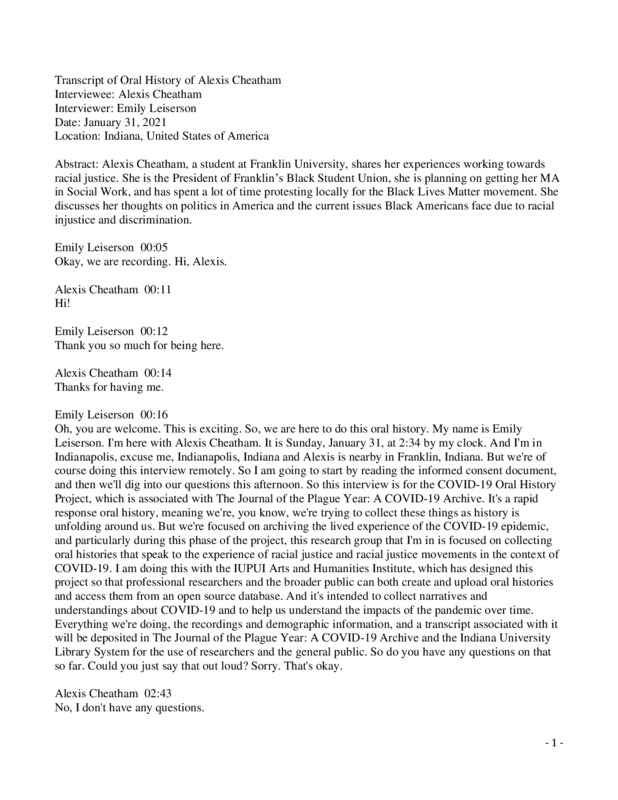 02/19/2021
02/19/2021Alexis Cheatham Oral History, 2021/02/19
C19OH -
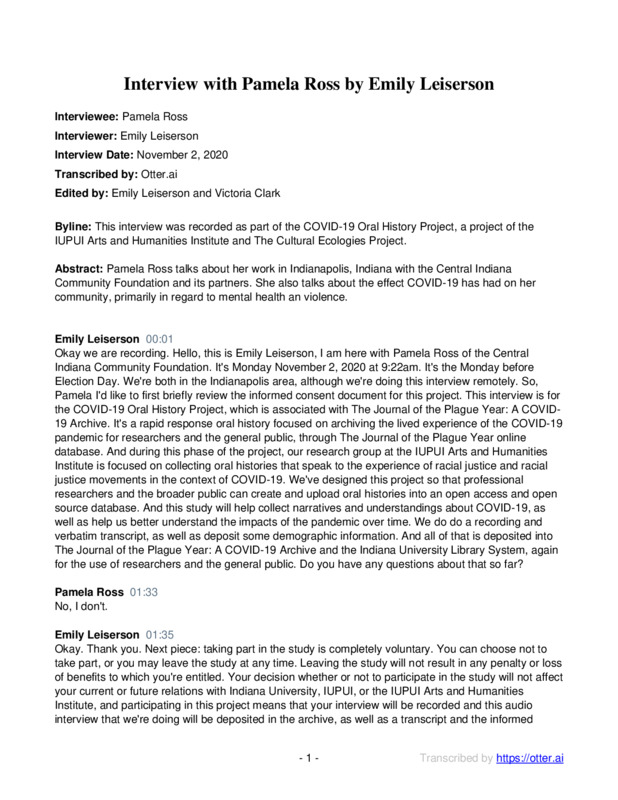 11/02/2020
11/02/2020Pamela Ross Oral History, 2020/11/02
This interview was recorded as part of the COVID-19 Oral History Project, a project of the IUPUI Arts and Humanities Institute and The Cultural Ecologies Project. -
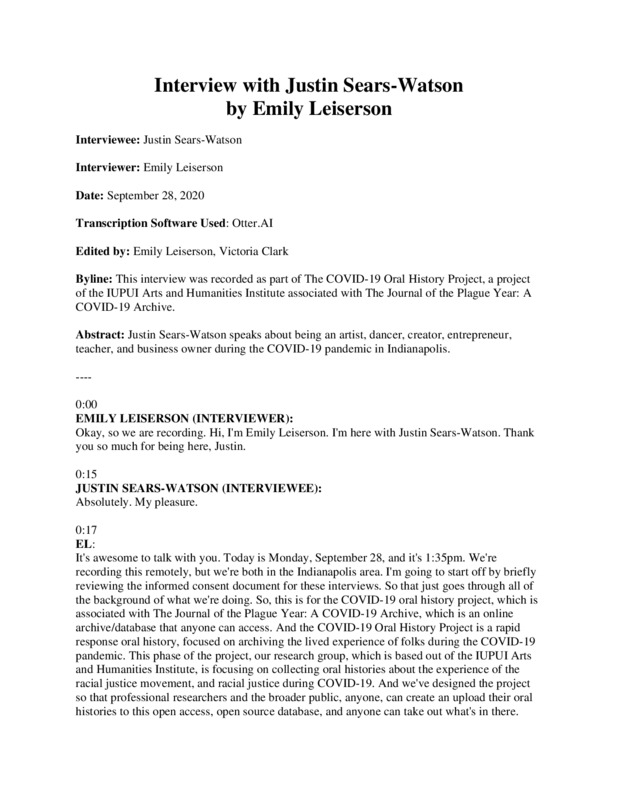 09/28/2020
09/28/2020Justin Sears-Watson Oral History, 2020/09/28
C19OH -
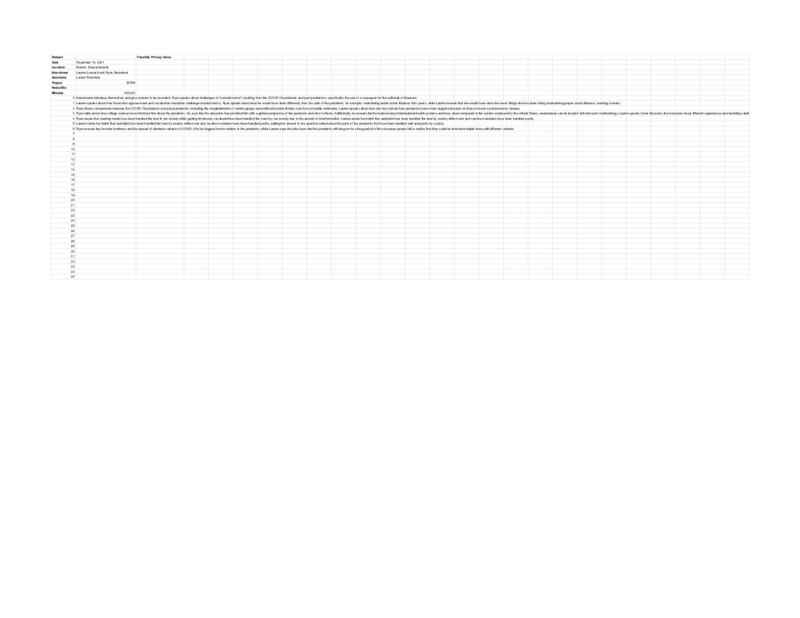 2021-12-10
2021-12-10Lauren Leonard and Ryan BreucknerOral History, 2021/12/10
A discussion with a peer about what we have learned about the COVID-19 pandemic through learning about other pandemics. -
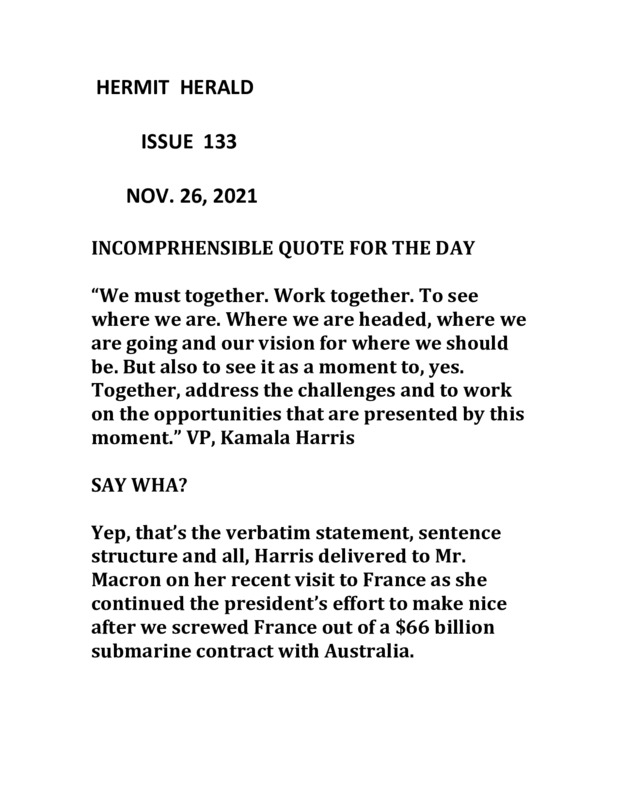 2021-11-26
2021-11-26HERMIT HERALD, ISSUE 133
Kamala Harris, dazed and confused -
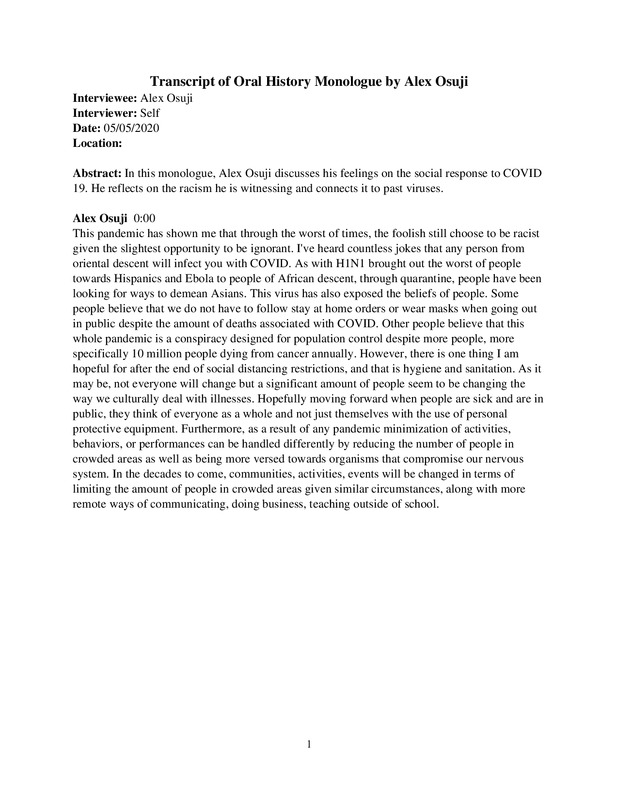 2020-05-20
2020-05-20Alex Osuji Oral History, 2020/05/05
In this monologue, Alex Osuji discusses his feelings on the social response to COVID 19. He reflects on the racism he is witnessing and connects it to past viruses. -
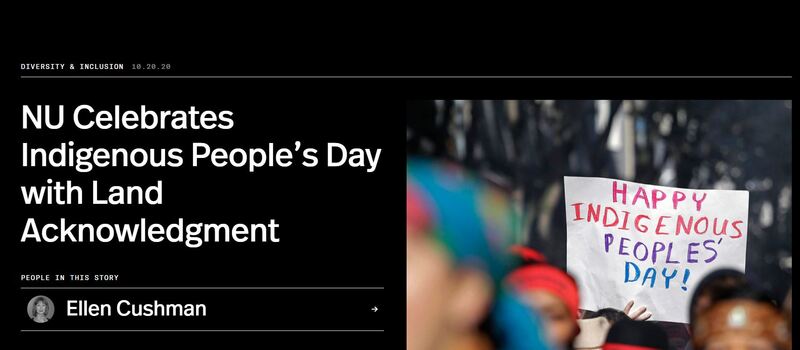 2020-10-20
2020-10-20Northeastern Virtual Indigenous People's Day 2020
Article regarding virtual Indigenous People's Day. -
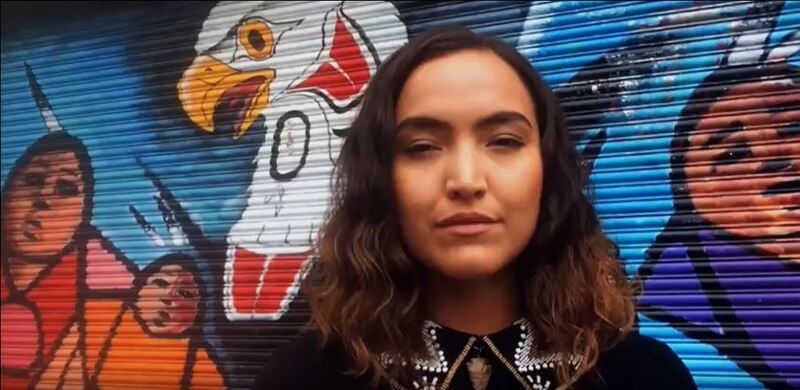 2021
2021What Does It Mean to Be Indigenous?
This is a video on being Indigenous by CBC News. -
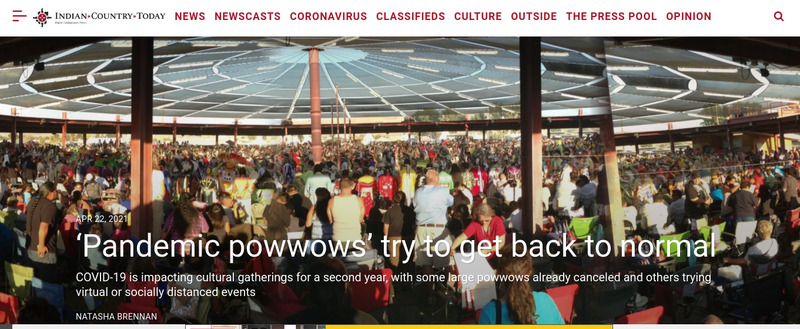 2020-09-14
2020-09-14Virtual Pow Wows - A result of Covid -19
Every year as a tradition Tribes of Native Americans gather to celebrate through song and dance at events known as Pow Wows. These events reinforce long-honored traditions, the most important being unification. The Pow wows allow for the togetherness of the people and the connectedness of the tribes. Covid -19 brought an abrupt halt to that for hundreds of indigenous tribes across the U.S and Canada. As a result, the only way to share some of these meaningful traditions was to offer a virtual option. While not the same it did allow for some of the singing and dancing competitions to take place. The long-term after effect though is that not having the in-person Pow Wow resulted in a significant loss of revenue for those tribes that were hosting the event. Pow Wows bring in significant revenue from vendors and non-indigenous spectators. This loss has had a trickle-down effect on the indigenous communities making it more difficult to endure the pandemic. As a parent of a Northeastern student, not having the ability to have my daughter physically share in the in-person powwows is disappointing. Pow wows are more than just celebrations they are an opportunity to connect with your identity and heritage-which is vital for the younger generations. -
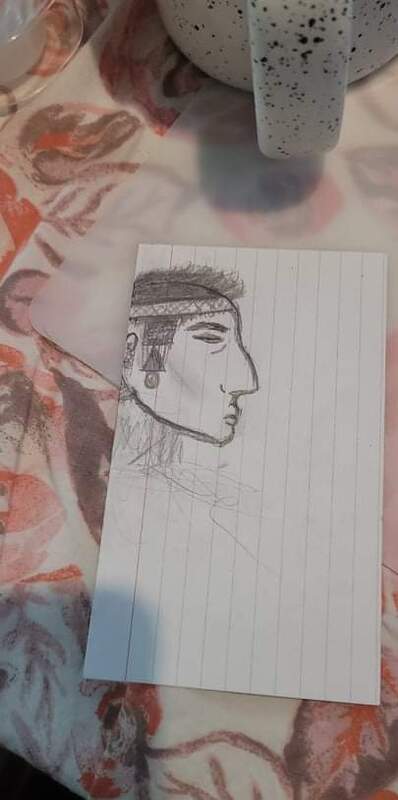 2020-03
2020-03Being Indigenous During COVID-19
I am a Game Art major at Full Sail University, but my sister goes to Northeastern University, so we are a Northeastern family. I am of Mayan descent, so living through COVID-19 was a little scary because we got all the news and updates about how COVID-19 was ravaging Mayan communities in Guatemala. We live in the USA in a rural area, so we were a little "safer," but the fear remained. I am proud of my people and my heritage, and I don't doubt our ability to survive the pandemic. Here is a quick sketch I made. -
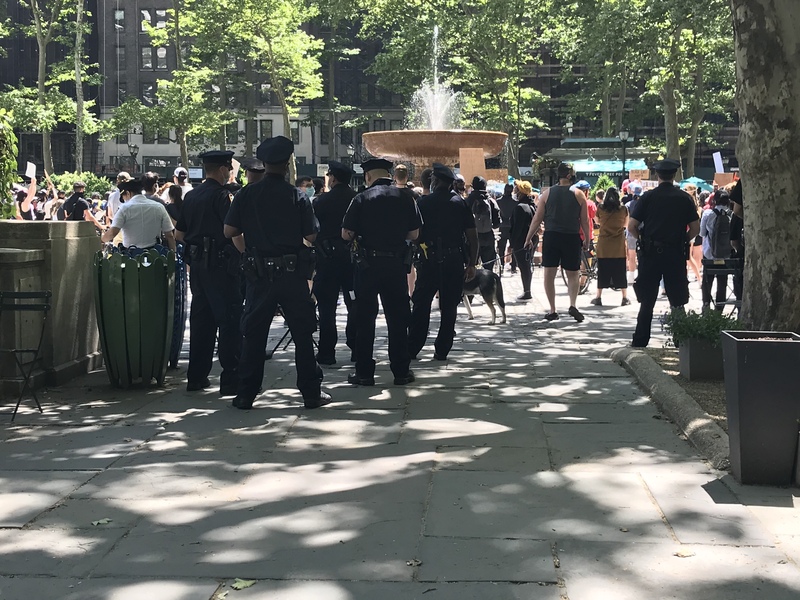 2020-05
2020-05Images from George Floyd Protests and BLM Demonstrations in New York City
Images taken of signs held while listening to speeches from BLM activists. Another image shows a cluster of police during a demonstration in Midtown Manhattan. -
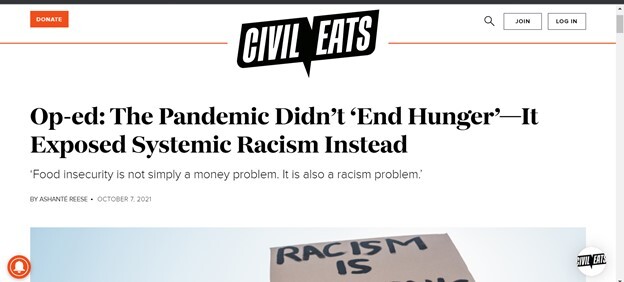 2021-10-07
2021-10-07Exposing Systemic Racism in all Areas
While some believed the pandemic aid solved food insecurity, that couldn't be further from the truth in black neighborhoods. -
 2020-05-31
2020-05-31I Can't Breathe
We marched up 4 miles of downtown Greenville chanting his name throughout the streets. I remember feeling like his name was a battle cry. I call to action. And a call for us to rise up and understand the true meaning of reason of why we choose to gather here today. George Floyd. His life was was tragically taken but his legacy was lovingly memorialize. It was beautiful to see and take part of historical moment like that. A moment of where a marginalized individual was taken out of the gaps and silences of history and placed right front and center within our cultural and society. -
 2020-06-03
2020-06-03Take the Pledge
I regrets speaker's name but remember the impact of her words at the Black Lives Matter protest held in Anderson, South Carolina. This speaker talked about the importance of peace and understanding when joining arms with brethren and allies during pivotal times. I remember her walking off the platform and wishing I could her more. Overall, her speech was fierce, firm, and empathetic to us and the cause. Her call to action by asking the audience to take a pledge embodies to true spirit and essence of Black Lives Matter protest. -
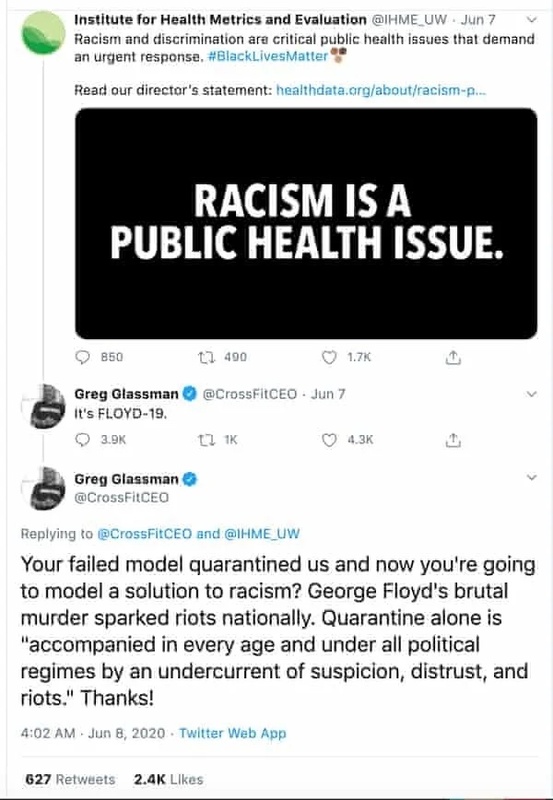 2020-06-08
2020-06-08Racism like Public Health?
Amidst Covid-19, the documentation of the police killings have been manifested into comparisons with the world-wide pandemic. These comparisons reflect the ongoing disparities between Black Americans and systemic racism. The Institute for Health Metrics and Evaluation takes to Twitter to try to support this comparison but faces a backlash from a fellow BLM support who argues that the comparison is invalid based on the different progress the BLM protest and quarantine had made. I felt like this was important for me to post because I feel like it shows an effort from BLM supporters to combat the racism within our culture by arguing that society must view and address racism as a public health issue. Yet, the tweet continues to evolve as ironic as the lack of regards Americans have for coronavirus policies and laws continues to grow everyday. Base on how events go, we might regard the validity of this statement to be false down the road. -
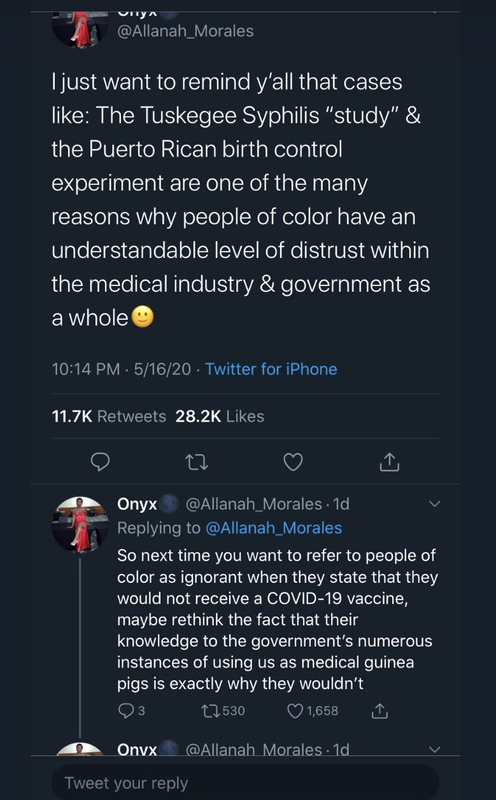 2021-05-16
2021-05-16Vaccine Hesitancy in the Black Community
This tweet reflects an ongoing controversy of the Covid-19 vaccine. The media has reported a hesitancy of the mRNA vaccine amongst the black community, but with little to no context on why there is such hesitancy. Based on the history of the U.S. public health institution, there have been reported inequalities that include a racial hierarchy within the medical system. This tweet specifies the instances of medical malpractice committed towards people of color and insists on an understanding of racial inequality through the lens of people of color that led to skeptical feelings about the vaccine. -
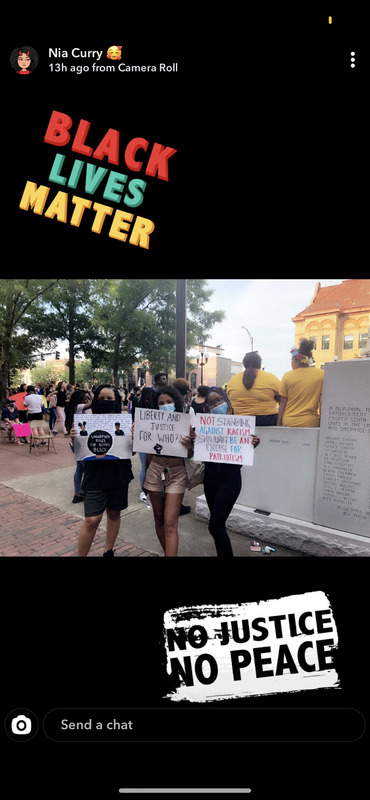 2020-06-04
2020-06-04Small Town, Big Affairs
The challenges of both COVID-19 and the lockdown illuminated the disproportionate burden black and brown communities have been facing with jobs, communities, and police. In the midst of the profound trauma of George Floyd's death, many communities had to come together to address what parameters were they enforcing for both the health and safety for its member. Many protest like the one shown in Anderson, South Carolina took place May-August of 2020 to demonstrate how a growing pandemic forced individuals to think about others' vulnerabilities--specifically those inflicted from police brutality. -
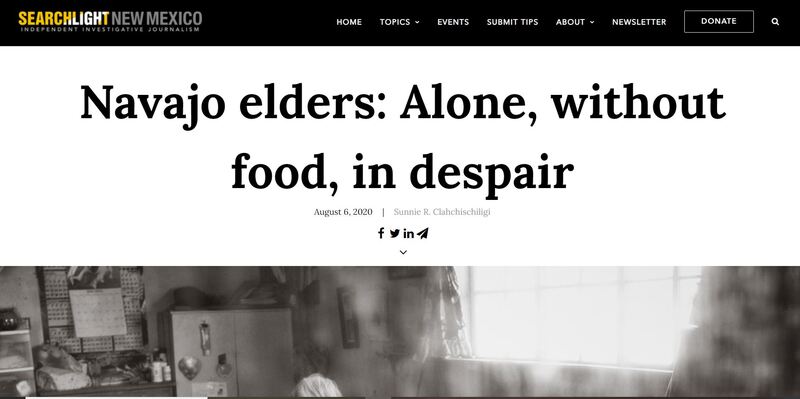 2020-08-06
2020-08-06Native American / Navajo Elders
I live relatively close to the Navajo reservation and my elderly father lived with me during the pandemic. The experiences of suffering of Navajo elders so close by is heartbreaking but tells the story of deep divides in resources and experiences. -
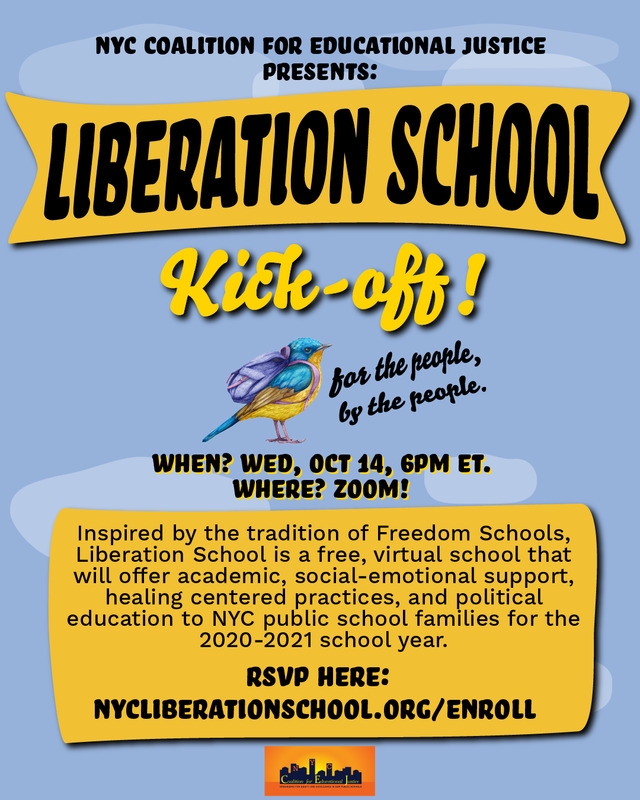 2020-10
2020-10Liberation School: the Mobilization of Back and Brown Parents, Healers and Educators
Liberation School was a free, virtual online school that offered academic support courses, social-emotional support, healing centered practices, and political education courses to NYC public school families throughout the 2020-21 school year. Created by the NYC Coalition for Educational Justice, the city's largest parent organizing group, Liberation school was designed as a response to the failings of the Department of Education to adequately provide the resources and support needed for marginalized students. While many principals, teachers and school staff put their hearts and souls into supporting NYC children during this global pandemic, it was clear that families could not solely rely on City Hall and the Department of Education to deliver a safe, quality education to children finishing out the 2020 school year and going into the 2020-21 school year. Black and brown students and families in New York City have faced the harshest, most devastating impacts of the COVID-19 pandemic and systemic racism. Previous inequities in the school system have revealed themselves and worsened. The Department of Education (DOE) and City Hall did not provide the necessary resources and support for parents and youth navigating remote and blended learning for the first time in a timely fashion or accessible to non-English monolingual families. While many white affluent families were hiring teachers to create learning pods, CEJ designed Liberation School for Black, Brown, Immigrant, and low-income families, who don’t have the financial resources to hire personal teachers or tutors. An important value that shaped the creation of Liberation Schools is the idea of what it truly means to be an ‘inclusive school’. Language Justice is also Educational Justice. CEJ created sessions accessible to the public in multiple languages. Through both multilingual instructors and simultaneous interpretations of English workshops, LS also offered sessions using commonly-used online platforms, outdoor spaces, and live streaming on social media. All courses that were culturally responsive in content and pedagogy and many were conducted in English and Spanish, and some workshops in, Bangla and Mandarin. CEJ was inspired by the tradition of Black Freedom Schools in the 1960s. After Brown v. Board, many schools were still segregated and led to many student movements organizing and fighting for true integration in Northern Cities like Chicago, Boston, and NYC. The first examples of Freedom Schooling were created in the North as an alternative space for students to go to during boycotts in 1963 and 1964. One of most prime examples of Freedom Schooling were the Freedom Schools created by the Student Nonviolent Coordinating Committee (SNCC) in Mississippi. Freedom Schools provided an educational experience for young Black Mississippians to challenge the myths of society, find alternatives to the segregated and racist white supremacists society, to understand the conditions of their oppression, and to create directions for actions in the name of Freedom. There were three general areas for the curriculum of Freedom Schools. One was academic work, which centered around the needs/or interests of the students that incorporated their real life experiences and learning about Black History or understanding the structural institutions. There were also creative activities such as writing, journaling, or arts. The last area was on developing leadership skills and helping students be a part of the change in society. -
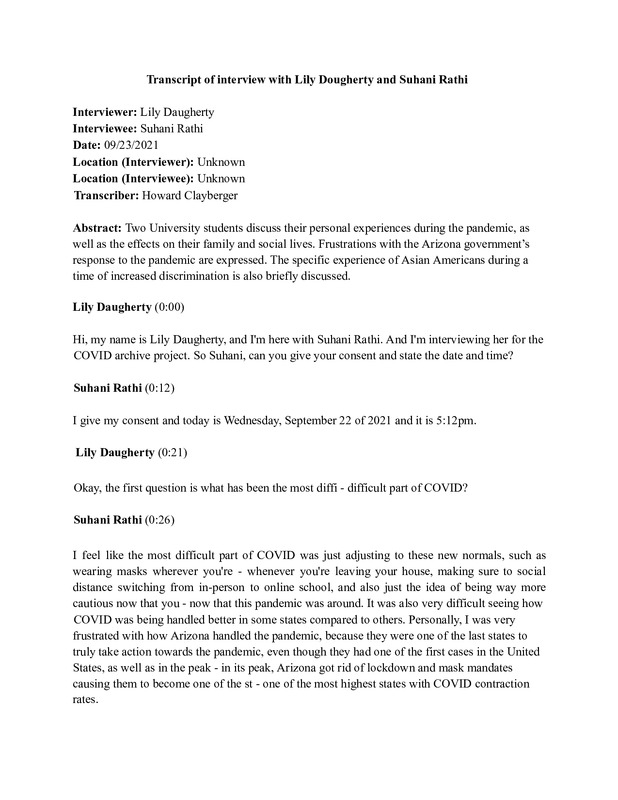 2021-09-23
2021-09-23Lily Daugherty and Suhani Rathi Oral History, 2021/09/23
Two University students discuss their personal experiences during the pandemic, as well as the effects on their family and social lives. Frustrations with the Arizona government’s response to the pandemic are expressed. The specific experience of Asian Americans during a time of increased discrimination is also briefly discussed. -
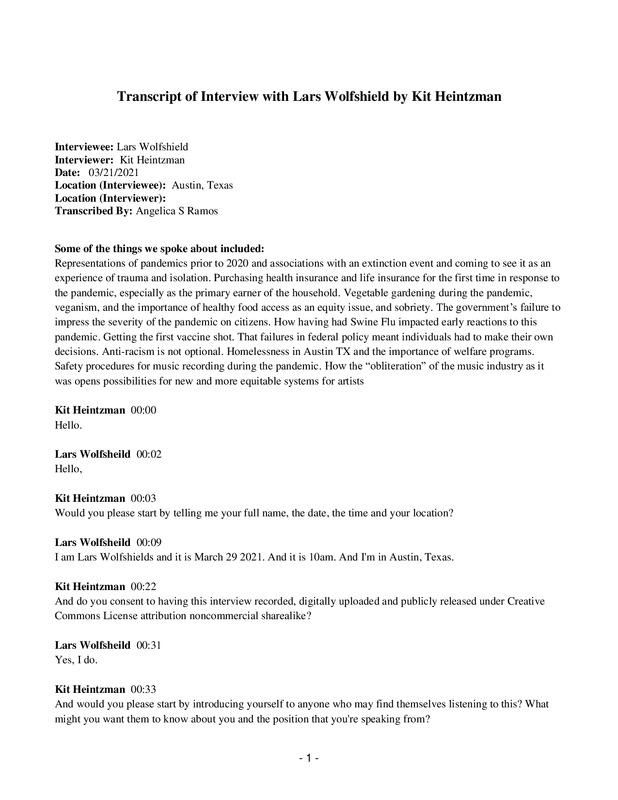 2021-03-29
2021-03-29Lars Wolfshield Oral History, 2021/03/21
Self-Description: “I am a pansexual and gender fluid artist and artist manager and I work primarily with Black and queer musicians and bands.” Record label: https://www.instagram.com/wolfshieldrecords/ -
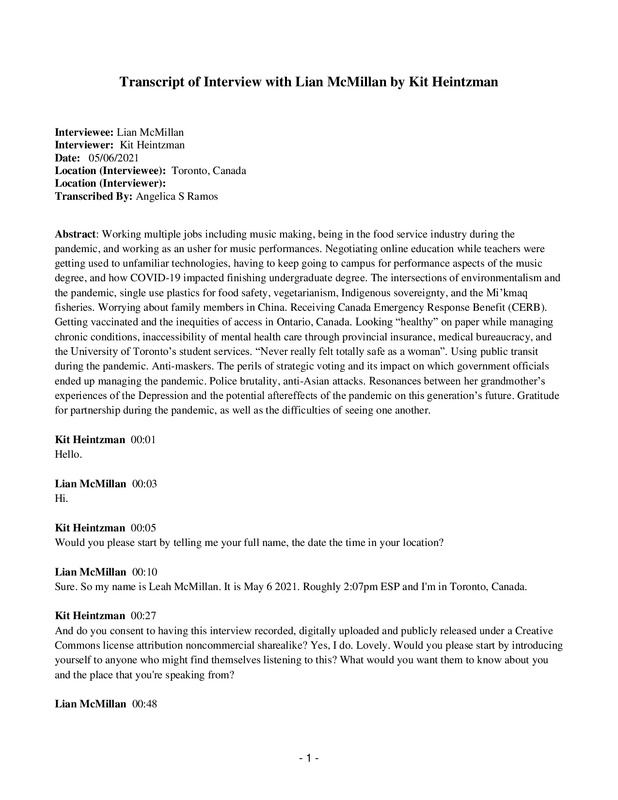 2021-05-06
2021-05-06Lian McMillan Oral History, 2021/05/06
Self Description: “I’m a 21-year-old musician. I just recently graduated from U[niversity] of T[oronto] a week ago, and I graduated with a classical percussion degree. I play for a band called cutsleeve. We’re a group of east Asian, queer sound musicians. I’m a mixed race woman, my father is white, and my mother is Chinese. I’ve lived in Canada, the [United] States, and I lived in Shanghai for a few years. I’m a dog owner.”
